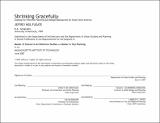Shrinking gracefully : looking for effective planning and design approaches for small town America
Author(s)
Fugate, Jeffrey N
DownloadFull printable version (22.36Mb)
Alternative title
Looking for effective planning and design approaches for small town America
Other Contributors
Massachusetts Institute of Technology. Dept. of Architecture.
Advisor
Susan C. Silberberg-Robinson.
Terms of use
Metadata
Show full item recordAbstract
The term "shrinking" is often considered a death sentence for Small Town America. Public officials, planners and residents often try to "solve" the condition of shrinking, applying the same tool kit used for growth, with little success. A widespread assumption is that shrinking is the opposite of growth and synonymous with decline, and therefore common practice in planning and design practice has been to try and reverse the trend of population loss, often with last-ditch efforts such as free land offers, problematic industrial recruitment or unrealistic visioning exercises. If growth, even in its most destructive forms, can be made smart, can shrinking be made graceful, and if so what approach is needed to achieve it? This thesis argues that shrinking is not the opposite of growth but rather requires a much more complex and nuanced understanding, and that the condition of shrinking does not have to be a terminal diagnosis for a small town. Those communities that identify, adapt, and reuse existing human and physical assets can in fact shrink gracefully, especially given that shrinking is seldom a rapid process, but rather one that plays out over generations, providing the luxury of time to be purposeful about the planning and design process. (cont.) The stories of two very different communities are told here. Each, in response to generations of shrinking, has recently engaged in asset-based planning processes. These two approaches lead to suggestions of a planning approach that diverges from the traditional rural development model, which relies heavily on physical infrastructure investment. Rather, by engaging the realities of the shrinking condition, being deliberate in the planning process, and linking the creation of social capacity to the tools of physical planning and design most likely to be utilized when faced with limited resources--in particular: adaptive reuse of community icons, consolidation of redundant programs, multi-purpose physical infrastructure--a community can meet the challenge of shrinking gracefully.
Description
Thesis (M.C.P.)--Massachusetts Institute of Technology, Dept. of Urban Studies and Planning; and, (S.M.)--Massachusetts Institute of Technology, Dept. of Architecture, 2007. This electronic version was submitted by the student author. The certified thesis is available in the Institute Archives and Special Collections. Includes bibliographical references (p. 69-72 ).
Date issued
2007Department
Massachusetts Institute of Technology. Department of Architecture; Massachusetts Institute of Technology. Department of Urban Studies and PlanningPublisher
Massachusetts Institute of Technology
Keywords
Urban Studies and Planning., Architecture.